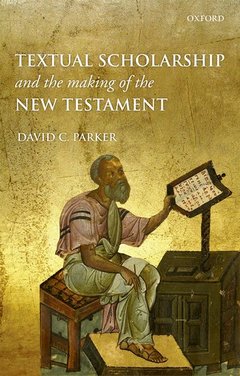Description
Textual Scholarship and the Making of the New Testament
Author: Parker David C.
Language: English
Publication date: 10-2012
208 p. · 14.8x21 cm · Hardback
208 p. · 14.8x21 cm · Hardback
Description
/li>Contents
/li>Biography
/li>
The book is going through its biggest revolution since Gutenberg. Thanks to computer tools and electronic publication, the concept and realisation of critical editions are being rethought. As so often in the history of scholarship, editors of the New Testament are making a vital contribution to these changes. In this book, originally the Lyell Lectures in Bibliography at Oxford, David C. Parker explores textual scholarship, in particular the idea of the edition. He argues that textual scholarship has had an important influence on the meaning given to the term 'New Testament'. Starting with the observation that a text is a process, not an object, he proposes a new way of understanding the relationship between manuscripts, the texts which manuscripts contain and the work they represent as the basis for critical scholarship. This leads him to challenge the idea of a 'Greek New Testament manuscript', and thus to reconsider the nature of the New Testament as a collection of works and the nature and purpose of critical editions. By studying new tools for studying how manuscripts are related to each other, he shows how the modern digital edition of the New Testament has overcome the impasses created by the failure of Lachmannian stemmatics to deal with the problem of contamination. Exploring the emergence of the critical edition in modern scholarship, Parker discusses the ways in which a digital edition advances scholarship and gives the reader more opportunities both to scrutinise the quality of the edition and to access the raw data on which it is based. The whole book uses New Testament research as a paradigm of wider changes in textual scholarship.
1. 'The General Procedures'. 2. What is a New Testament Manuscript?. 3. Understanding How Manuscripts are Related. 4. Editing the Greek New Testament. 5. The New Testament of the Future. 6. Conclusions.
David Parker, FSA is Edward Cadbury Professor of Theology in the University of Birmingham, a Fellow of the British Academy, and Director of the Institute for Textual Scholarship and Electronic Editing. He is Executive Editor of the International Greek New Testament Project, which is making critical editions of the Gospel of John and Paul's letters and is also on the editorial committee of the Nestle-Aland (29th edition) and United Bible Societies (sixth edition) Greek New Testaments. He has published widely on New Testament manuscripts and textual scholarship, and is also a pioneer in developing digital tools and editions, such as the virtual Codex Sinaiticus, the Virtual Manuscript Room and online editions at www.iohannes.com.
© 2024 LAVOISIER S.A.S.


